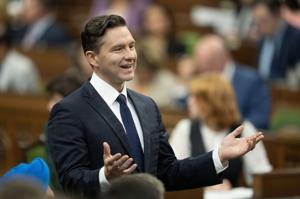
Parliament is back with a bang and things are not going Pierre Poilievre’s way. It started with a stinging byelection loss for the Conservatives in Winnipeg’s Elmwood—Transcona, where they spent considerable resources trying to win a seat from the NDP. Conservative signs urged voters to reject NDP Leader Jagmeet Singh for crafting a deal with the Grits — “Sellout Singh” as he was branded on posters standing next to Prime Minister Justin Trudeau — and for supporting the Liberals’ carbon levy.
It’s too early to tell how many voters were swayed by the message — Singh certainly tried to distance himself from the Grits by pulling out of the supply and confidence agreement and opened the possibility he’ll walk back support for a consumer price on carbon. But what is clear is that progressive voters, faced with a binary choice, flocked to the NDP. Despite a 16 per cent increase in Conservative support, the NDP vote held steady, likely because Liberal voters shifted to its side.

The result? Conservatives were unable to project themselves as a party with momentum, riding a wave of support after their byelection success in Toronto—St. Paul’s in June, and demonstrating to voters that Canadians were rejecting the Liberal/NDP agenda. It wasn’t the only Conservative setback.
Welcoming parliamentarians back to Ottawa was a small crowd of “F—k Trudeau” hecklers, who accused the prime minister of being “Satan,” of sexually grooming children, and of treason. If Canadians needed a reminder of whose support Poilievre has been courting, it was right there for all to see. It didn’t help that Conservative MP Michael Cooper with the protesters and with them.
, Cooper said he was “in no way associated with these individuals” and had just been in a restaurant where he was recognized by them. He accused the Liberals of spreading lies about him. Wednesday should have been a great day for the Tories.
The Liberals had offered them an opposition day in the House next week, and Poilievre announced he would use it to put forward a simple motion of non-confidence in the government. It was a win-win: he would either get to show voters that Singh and Bloc Québécois Leader Yves-François Blanchet are hypocrites who claim not to support Trudeau but prop up his government, or he would get a federal election. But Blanchet stole Poilievre’s thunder when he said the Bloc would vote against the motion.
Blanchet didn’t have confidence in the Trudeau government but, he said, he was “reasonably confident” he could get increased pension payments and protection for supply management — and, if the Liberals didn’t meet his demands, he was “reasonably confident” he’d get a chance to defeat them. What was more telling, however, was his take on Poilievre. “I know the Conservatives’ values and they are not Quebecers’ values,” he said.
There was nothing in the non-confidence motion, Blanchet said, but Poilievre’s “personal and disproportionate ambition” and his “impatience” to rule — which he didn’t give “a damn” about. The next day, it was the NDP’s turn. Despite Singh having said the Liberals “can expect no help and no support from us,” the New Democrats wisely tried to unpaint themselves out of that corner.
With cover from the Bloc, the NDP tried to safeguard any influence it could have in obtaining policy gains and setting the timing of the next election. Singh set his sights on Poilievre as well, accusing him of wanting to cut pharmacare, health care, pensions and dental care. “Our plan is to stop him.
” Though the Bloc and the NDP have their beefs with the Liberals, their leaders acknowledged this week that the greatest threat to the policies they champion are the Conservatives. Even when Quebec Premier François Legault called on the Bloc Thursday to side with the Conservatives and defeat the Trudeau government, it was Poilievre who suffered from the endorsement. Quebec’s newspapers for suggesting the province would be better off with a prime minister who wants to build a , opposes construction of a tramway in Quebec City, and has offered no commitments on health care or dental care.
Meanwhile in the House of Commons, Poilievre was asking the Bloc why was abandoning Quebec’s sovereigntists. Yes, that’s right, the leader of the Conservative party — a federalist party — accused the Bloc of not defending the interests of separatists. Liberal House Leader Karina Gould was all smiles that day.
Assured the government would survive, she scheduled another Conservative opposition day for next Thursday, minimizing the Grits’ chances of defeat as swiftly as possible. The Liberals appeared revived in Parliament. The Conservatives sounded like trained seals.
Over and over, they stood up to repeat the same line — “after nine years of the NDP-Liberal government, taxes are up, prices are up, crime is up and time is up” — and to demand a “carbon-tax election” that no other party wants. And that leaves Poilievre with other problems on his hands. He tightly controls his ship, but it has unhappy sailors.
Conservatives MPs are mostly banned from official travel with other parliamentarians. Whether that is, as some suggest, to prevent them from befriending other MPs, or so that Poilievre can accuse the other parties of spending taxpayers’ money unnecessarily, the result is discouraged members who want to be more than partisan parrots. Another problem for the Conservatives is that encouraging economic data is starting to challenge Poilievre’s talking points.
Inflation is now , the lowest rate since February 2021. Gas prices are down. .
Even Canada’s (although still far from the 2030 target). If Canadians start feeling like life isn’t all that bad, what will Poilievre offer then?.














